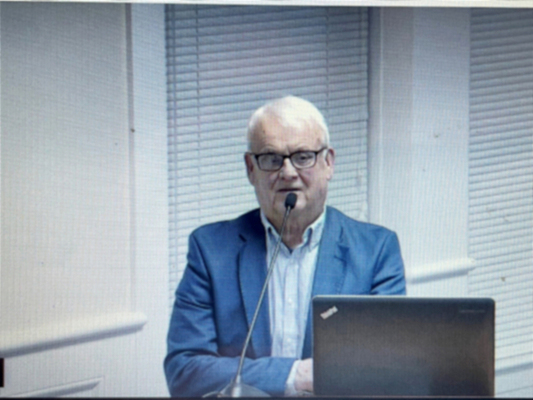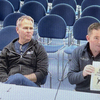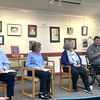Report Says Behavioral Support Services Lacking
 Fran Kelly presents the findings from the safer communities task force to the select board on March 27. RYAN BRAY PHOTO
Fran Kelly presents the findings from the safer communities task force to the select board on March 27. RYAN BRAY PHOTO
ORLEANS – The select board convened the safer communities task force with the goal of looking into the issue of gun violence on a local level. But the task force’s final report put perhaps a greater emphasis on another pressing issue: mental health.
Task force chair Fran Kelly went before the select board in March to present the final report, the culmination of 10 meetings the task force held since August of last year. While gun violence was not found to pose a significant problem in Orleans, it revealed that increased access to behavioral health services is needed for communities on the Lower and Outer Cape.
“At the end of the day, mental health is a real challenge here on Cape Cod,” said Orleans Fire Chief Geof Deering, who served on the task force. “And in Orleans, having a group to digest that and put it into a report and say, ‘these are the things we would recommend,’ that could be helpful to our community.”
The task force was formed in the wake of the fatal shooting at Robb Elementary School in Uvalde, Texas, in May 2022. In that attack, a teenage gunman shot and killed 19 students and two teachers and injured 17 others.
“Sadly we’ve seen that in rural areas, urban areas,” Kelly told the select board March 27. “We’ve seen it in churches and schools, public gatherings, sporting events, et cetera.”
The task force was charged with documenting all instances of gun violence across Barnstable County and looking at data to see how documented instances in Orleans compare with those in neighboring communities. It also explored ways local agencies including the Orleans police and fire departments, as well as the town’s health department, can provide added support to people in danger of committing violence or being victims of it themselves.
Eventually, the task force expanded its charge to also look at local instances of domestic violence and mental health. The task force collected input and data from nine local agencies for its report, including the Orleans Council on Aging, the Samaritans on Cape Cod and the Islands, Massachusetts Department of Public Health, Bay Cove Human Services, Outer Cape Health, Independence House and the Nauset Public Schools, as well as the town’s police and fire departments.
“These people came before the committee, spent at least an hour with us, talked about their programs, told us about their concerns, told us about their recommendations,” Kelly said. “Not only for Orleans, but for other Lower and Outer Cape towns as well.”
The task force found that while gun violence is “not a particular problem” in Orleans, local agencies should continue to monitor and analyze data related to gun violence in town.
I think everyone in this room would agree that that doesn’t mean there isn’t the potential for awful events with guns,” Kelly said. “They can occur anywhere in this country.”
And while suicide similarly was not identified as a specific problem in town, statistics in the report showed the impact it has on segments of the broader population. Persons 45 to 64 on the Cape are at highest risk of suicide, as are men older than 85.
The task force report also called local accessibility to behavioral health services “problematic” and outlined a number of recommendations geared toward boosting those services on the Lower and Outer Cape. These include collaborating with Lower and Outer Cape towns to fund behavioral health services and clinicians, and creating a “central file” in town where people can find the information they need about available support.
“We found that information was lacking in terms of people knowing what services existed in this community, as well as on the Outer and Lower Cape,” Kelly said.
Other recommendations include creating “community-based learning opportunities” in the form of workshops, forums and lectures to better educate people on behavioral health and help people identify signs of behavioral health issues. There’s also a recommendation that the town explore adding a clinician to the ranks of the health department.
Deering called the addition of a mental health professional in town hall one of the “top priorities” identified in the report, and one that could be actionable.
“At the fire department, we deal with people with mental health challenges all the time,” he said. “Our pathways to get them help are very limited, mostly through the emergency department, which is not always the best way. There isn’t really a lot of followup that connects police and fire and the council on aging and other groups to really take care of that person.”
Deering said the number of mental health calls coming into the fire department continues to increase, noting that there’s been noticeable growth in the last three years. That includes calls related to depression, anxiety, bipolar disorder, PTSD and suicidal thoughts, among other issues.
“We’ve seen a steady increase [in mental health calls] across the board in all ages, all groups,” he said. “It’s everywhere here. It seems to me there’s a significantly greater need, and the resources haven’t kept up with the demand.”
Town Manager Kim Newman said recommendations set forth in the task force report could be enacted as the town works toward establishing a health and human services department.
One area that wasn’t covered specifically in the task force’s presentation was drug addiction, as well as the number of overdoses that have been documented in Orleans.
“That whole sort of drug portion of the mental health question is, at least from what I understand, a fairly big problem in every town,” said Mefford Runyon of the select board. Kelly said specific overdose data might be folded in with police and fire department data, but noted that the growing presence of fentanyl on Cape Cod and elsewhere continues to be a problem (see related story elsewhere in this edition).
Andrea Reed of the select board quoted Council on Aging Director Judi Wilson, who in the report said “mental health is healthcare.” But she lamented how behavioral health supports have lagged in recent years not just on the Cape, but nationally.
“We’ve dismantled mental health I believe more than 20 years ago in this country, and like other problems, we’re kind of just catching up and recommitting to a holistic approach to it,” she said.
But while there’s still much to be done, Kevin Galligan of the select board said the task force’s work to address the problem should be commended.
“The select board, in creating this, knew how sensitive this topic was, and you’ve addressed it incredibly well,” he said. “Professional presentation, the reports, the involvement of the community. I really can’t say how proud I am as a community to have the courage to take this on.”
The report is available on the safer communities task force page of the town’s website.
Email Ryan Bray at ryan@capecodchronicle.com
Please support The Cape Cod Chronicle by subscribing today!
You may also like:






